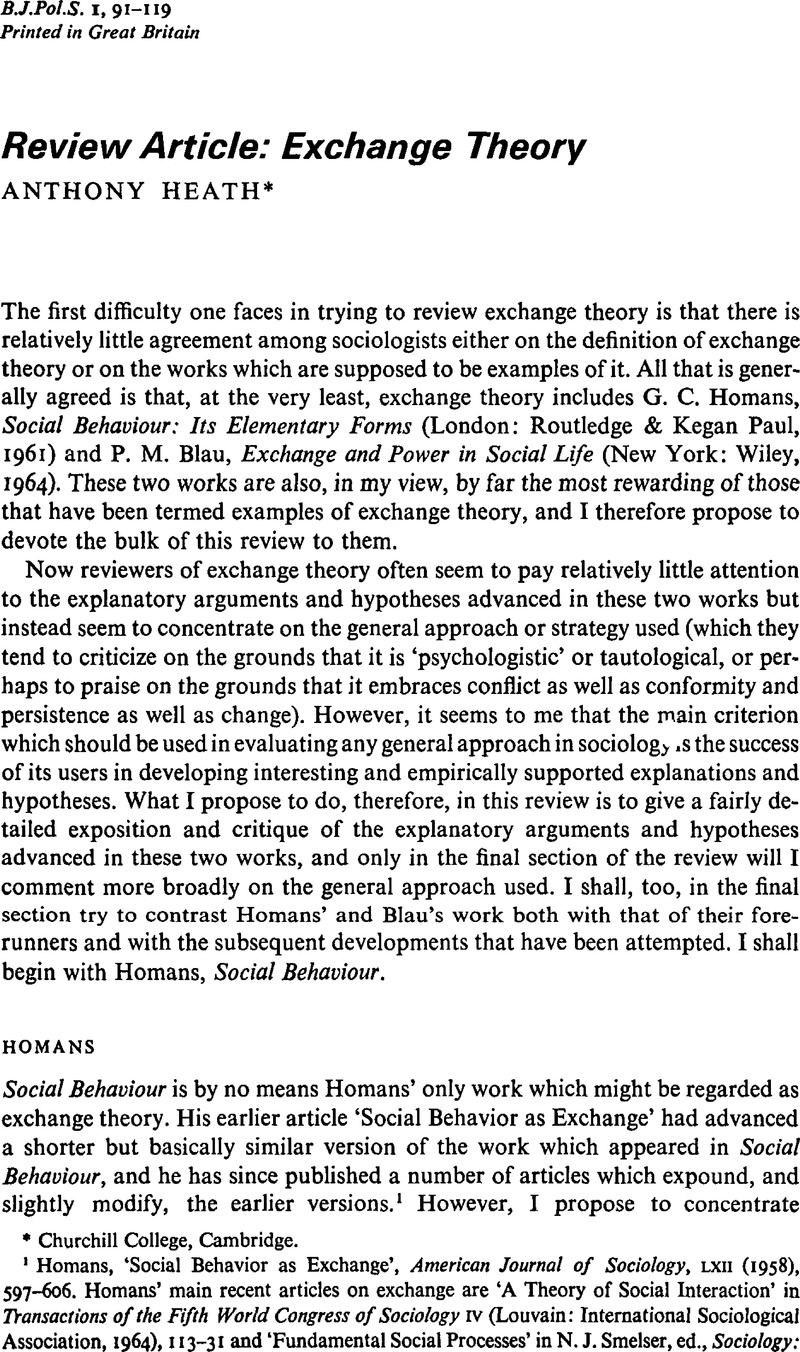Article contents
Abstract

- Type
- Review Article
- Information
- Copyright
- Copyright © Cambridge University Press 1971
References
1 Homans, , ‘Social Behavior as Exchange’, American Journal of Sociology, LXII (1958), 597–606.CrossRefGoogle ScholarHomans’, main recent articles on exchange are ‘A Theory of Social Interaction’ in Transactions of the Fifth World Congress of Sociology IV (Louvain: International Sociological Association, 1964), 113–31Google Scholar and ‘Fundamental Social Processes’ in Smelser, N. J., ed., Sociology An Introduction (New York: Wiley, 1967), 30–78.Google ScholarHomans, also explains his approach to theory construction in ‘Contemporary Theory in Sociology’ in Faris, R. E. L., ed., Handbook of Modern Sociology (Chicago: Rand-McNally, 1964), 951–77Google Scholar, in ‘Bringing Men Back In’, American Sociological Review, XXIX (1964), 809–18Google Scholar, and in The Nature of Social Science (New York: Harcourt, Brace and World, 1967).Google Scholar
2 I have taken the wording of the first four propositions from Homans, , ‘Fundamental Social Processes’, pp. 33–7Google Scholar as they are expressed slightly more clearly here and with no substantial change in meaning. The wording of the fifth proposition I have taken from Homans, , Social Behaviour, p. 75Google Scholar as it is distinctly different from that given in ‘Fundamental Social Processes’.
3 See, for example, White, S. H., ‘Generalization of an Instrumental Response with Variations in Two Attributes of the CS’, Journal of Experimental Psychology, LVI (1958), 339–43CrossRefGoogle Scholar and Verplanck, W. S., ‘The Control of the Content of Conversation: Reinforcement of Statements of Opinion’, Journal of Abnormal and Social Psychology, LI (1955). 668–76.CrossRefGoogle Scholar
4 Homans, , Social Behaviour, p. 43.Google Scholar
5 See Gewirtz, J. L. and Baer, D. M., ‘The Effect of Brief Social Deprivation on Behaviors for a Social Reinforcer’, Journal of Abnormal and Social Psychology, LVI (1958), 49–56CrossRefGoogle Scholar, and Gewirtz, J. L. and Baer, D. M., ‘Deprivation and Satiation of Social Reinforcers as Drive Conditions’, Journal of Abnormal and Social Psychology, LVII (1958), 165–72.CrossRefGoogle Scholar
6 Homans, , Social Behaviour, p. 90.Google Scholar
7 Homans, , Social Behaviour, p. 148.Google Scholar
8 See Blau, , The Dynamics of Bureaucracy: A Study of Interpersonal Relations in Two Government Agencies, Revised Edition (Chicago: University of Chicago Press, 1963), p. 150.Google Scholar
9 Homans, , Social Behaviour, p. 234.Google Scholar
10 Homans, , Social Behaviour, p. 244.Google Scholar
11 Homans, , Social Behaviour, p. 245.Google Scholar
12 Homans, , Social Behaviour, p. 240.Google Scholar
13 Blau, , Exchange and Power in Social Life, p. 2.Google Scholar
14 Maclntyre, A., review, Sociology, I (1967), 199–201, p. 199.Google Scholar
15 Blau, , Exchange and Power in Social Life, p. 94.Google Scholar
16 See Jones, E. E.Jones, R. G. andGergen, K. J., ‘Some Conditions Affecting the Evaluations of a Conformist’, Journal of Personality, XXXI (1963), 270–88.CrossRefGoogle Scholar
17 I am here following the views expressed in Koopmans, T. C., Three Essays on the State of Economic Science (New York: McGraw-Hill, 1957).Google Scholar For a contrary view see Friedman, M., Essays in Positive Economics (Chicago: University of Chicago Press, 1953).Google Scholar
18 See Muir, D. E. and Weinstein, E. A., ‘The Social Debt: an Investigation of Lower-class and Middle-class Norms of Social Obligation’, American Sociological Review, XXVII (1962), 532–9.CrossRefGoogle Scholar
19 Blau, , Exchange and Power in Social Life, p. 135.Google Scholar
20 Blau, , The Dynamics of Bureaucracy, pp. 217–18.Google Scholar
21 Blau, , The Dynamics of Bureaucracy, p. 215.Google Scholar
22 Kerr, C. and Siegel, A., ‘The Interindustry Propensity to Strike’, in Kornhauser, A., Dubin, R. and Ross, A. M., eds., Industrial Conflict (New York: McGraw-Hill, 1954), 189–212.Google Scholar
23 On reduction in the social sciences see Nagel, E., The Structure of Science: Problems in t Logic of Scientific Explanation (London: Routledge and Kegan Paul, 1961), pp. 541–4.Google Scholar
24 Homans states that the notion of distributive justice is to be found in Aristotle, Politics, Book III, chapter 9 and in Jouvenel, B. de, Sovereignty (Cambridge: Cambridge University Press, 1957).Google Scholar
25 Blau, , Exchange and Power in Social Life, p. 13.Google Scholar
26 Thus Blau's discussion of unilateral services is based on Emerson, R. M., ‘Powerdependence Relations’, American Sociological Review, XXVII (1962), 31–41CrossRefGoogle Scholar and his discussion of fair exchange on Homans, Social Behaviour.
27 Homans, , Social Behaviour, p. 61.Google Scholar
28 Mauss, , The Gift, p. 1.Google Scholar
29 Mauss, , The Gift, p. 3.Google Scholar
30 Levi-Strauss, , The Elementary Structures of Kinship, p. xxiv.Google Scholar
31 Quoted in Knox, J. B., ‘The Concept of Exchange in Sociological Theory: 1884 and 1961’, Social Forces, XLI (1963), 341–6, p. 343.CrossRefGoogle Scholar
32 Adams, , ‘Inequity in Social Exchange’, p. 280.Google Scholar
33 Adams, J. S. and Jacobson, P. R., ‘Effects of Wage Inequities on Work Quality; Journal of Abnormal and Social Psychology LXIX (1964), 19–25.CrossRefGoogle Scholar
34 Adams, , ‘Inequity in Social Exchange’, p. 284.Google Scholar
35 Perhaps the most useful of this recent work, although adding little to Blau or Homans, are Blumstein, P. W. and Weinstein, E. A., ‘The Redress of Distributive Injustice’, American Journal of Sociology, LXXIV (1969), 408–18CrossRefGoogle Scholar; Edwards, J. N., ‘Familial Behavior as Social Exchange’, Journal of Marriage and the Family,xxxx (1969), 518–26CrossRefGoogle Scholar; Gergen, K. J., The Psychology of Behavior Exchange (Reading, Mass.: Addison-Wesley, 1969)Google Scholar; Nord, W. R., ‘Social Exchange Theory: an Integrative Approach to Social Conformity’, Psychological Bulletin, LXXI (1969), 174–208.CrossRefGoogle Scholar Useful critiques of exchange theory are Davis, J. A. and Boulding, K. E., ‘Two Critiques of Homans’ Social Behavior: Its Elementary Forms’, American Journal of Sociology, LXVII (1962), 454–61CrossRefGoogle Scholar; Robson, R. A. H., ‘The Present State of Theory in Sociology’ in Lakatos, I. and Musgrave, A., eds., Problems in the Philosophy of Science: Proceedings of the International Colloquium in the Philosophy of Science, London, 1965, Vol. 3 (Amsterdam: North-Holland, 1968)Google Scholar; Mulkay, M. J., Functionalism, Exchange and Theoretical Strategy (London: Routledge and Kegan Paul, 1971).Google Scholar
- 13
- Cited by


